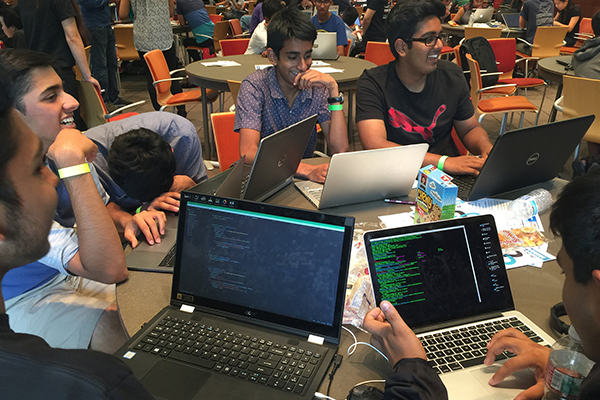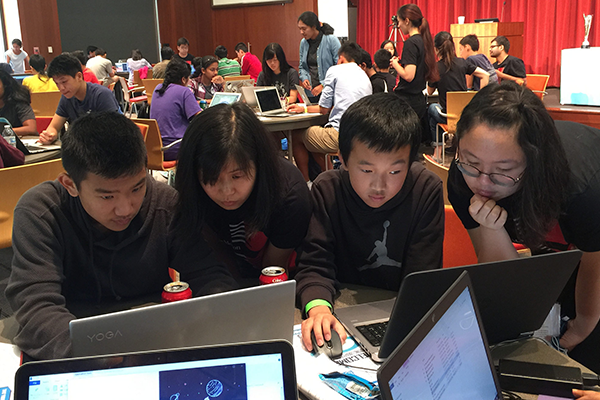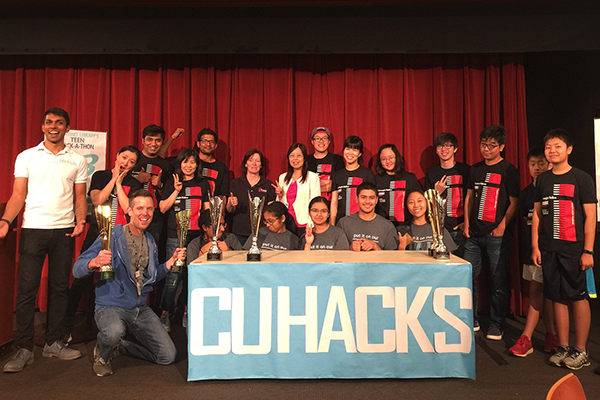CMU-SV students and faculty mentor teens in hackathon
This summer, students and faculty from CMU-SV collaborated with the Cupertino Library on their third annual Teen Hackathon, CU Hacks 3.
This summer, students and faculty from Carnegie Mellon University Silicon Valley (CMU-SV) collaborated with the Santa Clara County Library District (SCCLD) and Cupertino Library on the third annual Teen Hackathon (CU Hacks 3) in the Cupertino community. Students and faculty from CMU-SV worked closely with the library and acted as mentors for the local teens, who were invited to attend the free event held on Saturday, June 24, 2017.
The goal of the hackathon, which had the theme of “Smart City,” was to encourage local teens (age 14-18) to code prototype applications that would help the Cupertino community become a better place to live—all while giving the students hands-on knowledge in computer science and software engineering.
Regardless of age, anyone can be creative, hack, and create something of value.
Elaine Aw, Master’s Student, Software Management, CMU-SV
“I see parallels in the hackathon with what we do in school,” says hackathon mentor Elaine Aw, a master’s student studying Software Management at CMU-SV. “For example, in our classes, we identify real-world problems to solve with the development of minimal viable products. We form groups and create prototypes very rapidly to test in the market—all in a few weeks. In the hackathon, the students gathered their ideas in a short timeline, and they created prototypes to present on stage within a day. It was something challenging for them, and we were glad to facilitate their process with our experiences.”
Ten CMU-SV students from the Integrated Innovation Institute, the Department of Electrical and Computer Engineering, and the Information Networking Institute, as well as CMU-SV faculty Gladys Mercier and Catherine Fang, acted as mentors during the competition. CMU-SV Professor Catherine Fang coordinated with the event organizers, Cupertino Library’s Matt Lorenzo and Roslyn Donald, to define the mentor role. CMU-SV students used the skills they acquired at Carnegie Mellon by providing guidance to the teens on such topics as project idea brainstorming, team collaboration, quick research skills, debugging, and formality on final pitch.
Around 100 students participated in the competition, and students were divided into 15 teams of six to seven members, with participants separated into four B]beginner teams and 11 intermediate/advanced teams. The students’ applications, aka “hacks,” could include phone apps, websites, robots, and other innovative ideas that could contribute to bettering the community. The winning team created an image recognition app that, when given a photograph of a plastic or glass bottle, a container, or another object, would tell the user whether that item is recyclable or not.
While this collaboration with the Cupertino Library allowed CMU-SV to spread its resources to the teenagers and to the local community as a whole, the university and its students also gained much from the experience.
“It’s a two-way thing. On one hand, we share with the teens our experiences on building applications in a team context by managing codes in repositories like Github, and tips and tricks to debug issues,” explains Aw. “On the other hand, from the mentor side, you kind of feel young again. You can feel the energy in the room—the teens learned really fast, and it’s amazing that at their young age they were able to prove their ability to leverage new technologies, like Google Cloud Vision API and Firebase, to create new applications. It is a nice reminder that regardless of age, anyone can be creative, hack, and create something of value.”
Through this event, local community also gained a better understanding of the programs offered at the CMU-SV campus. One community member said, “It’s amazing that such a great educational resource is so accessible and close to us. It’s a big plus to our community.”
“The teens really learned a lot from all of the outstanding CMU mentors,” says Matt Lorenzo, the host of the hackathon. ”It was a wonderful collaborative effort, and in the end, the teens created some really awesome projects that went towards helping the Cupertino community. It would not have been possible without the help of the entire CMU mentor team. This event will keep getting better and better year after year.”



